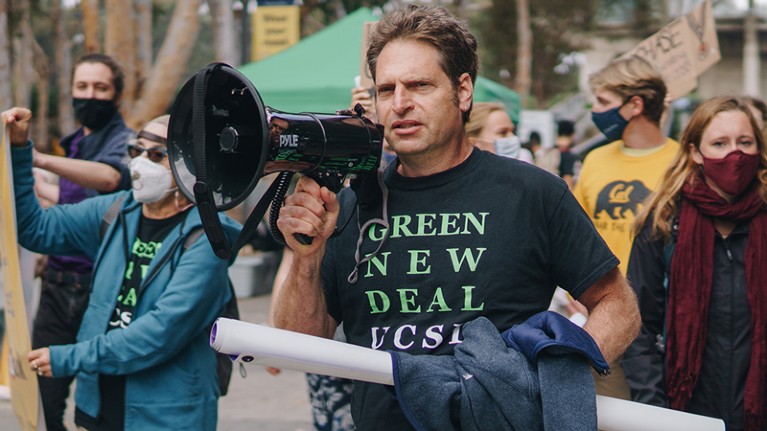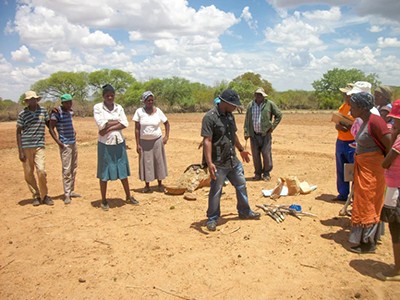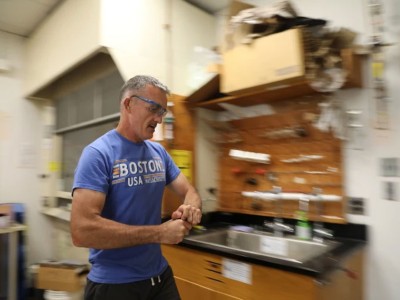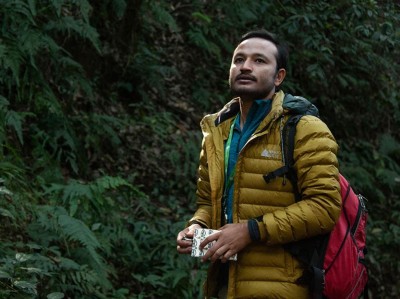
Neuroscientist turned climate-action researcher Adam Aron leads a protest against fossil-fuel investment at the University of California, San Diego.Credit: Green New Deal at UCSD
By 2021, Adam Aron had had a 20-year career in cognitive neuroscience at the University of California, San Diego (UCSD), having published more than 60 articles related to memory, impulse control and neurodegeneration. But, that year, he wrote to the US National Institutes of Health (NIH) to terminate the grant for his research on cognition.
A few years earlier, after reading a key report by the Intergovernmental Panel on Climate Change (IPCC), he had begun to understand just how dire the consequences of the climate crisis would be. He wanted to have a good answer for his children when, in a few decades, they ask him what he did in these crucial years to combat the worst effects of climate change.
He started by doing advocacy work on the side, including encouraging the governing board of the University of California to shift investments away from fossil fuels and towards renewable energy. He began teaching undergraduate classes on the psychology of climate change, and eventually shifted his research to focus on the social psychology of climate action. Aron talks to Nature about his career-transition challenges and his new research, and offers suggestions for others who might be interested in using their research skills to help the planet.
What led you to switch your focus to the climate crisis?
I didn’t realize how serious it was until around 2018, when I read the IPCC’s report on the impacts of a 1.5 °C rise in global temperatures. When I finally understood the gravity of the situation, I became more active as an activist and advocate while I was still a neuroscientist. The first thing I did was aiding the fossil-fuel-divestment movement. The second, much bigger, thing was co-founding the UCSD Green New Deal to campaign for more climate action from the University of California system. As I did more advocacy and teaching about the climate crisis, I found myself doing less and less neuroscience.
I train farmers to use plant science in the fight against climate change
It’s not like I decided one day not to be a neuroscientist — it was a gradual process of one thing taking over from the other. In 2021, my transition culminated when I got the latest instalment of my NIH grant, for around US$350,000. I thought, “I’m not going to take this. I have no intention of really doing this kind of research.” I sent the money back to the NIH and cancelled the grant.
Crashing my neuroscience career and then sending the money back was not something anybody wanted me to do or encouraged me to do. And it’s been a struggle in many ways that suddenly I’m not being encouraged or practically supported by my department because not everyone agreed with my decision. But because I had the privilege of tenure, I was able to make the shift without getting permission from the department.
How did that shift go for your research group?
I’ve continued as a professor at UCSD in the psychology department, but I’ve changed just about everything I’m doing, including the research. My laboratory is now called the Climate Psychology and Action Lab.
As for my group members, just before my shift, three postdocs moved on to assistant-professor jobs. One graduate student moved away from the neuroscience direction to the climate and ecological crisis, another finished her neuroscience PhD and a third stayed on the neuroscience track but still had several years to go. I worked hard to set that student up with collaborations and a new adviser, while making sure she could stay in our psychology department’s PhD programme.
‘I remind people all the time that science can wait’
It was a bit of a rocky process working out what kinds of question we should ask. We’ve settled on an approach to understand how to mobilize people to impel decision makers to implement changes in building, transportation, land use and agriculture to reduce emissions and restore ecosystems. We also need to see consumption reduction, sometimes called degrowth: we cannot expect the United States to get off fossil fuels if we, as a country, keep using them to expand the economy.
So, we’ve set up a series of studies in which we give people the opportunity to join collective action on the climate crisis, and track what they do as they go through the process. We’re trying to develop a social-science understanding of why people join collective action. And, as they do it, of what makes them more or less effective.
What have you found in your climate-activism research?
In one study1, we recruited students from a general campus population at UCSD, and for 12 weeks we put them through a crash course about the climate crisis and social movements, using videos. The study, published in 2022, was well done and captured many metrics, but not many of the participants became climate activists.
I took my case to Nepal’s highest court to improve conservation
For another study, yet to be published, we recruited students who already wanted to do something about the climate crisis. We met with them for a seven-week training programme on how to organize and join collective action. Whether people acted, we found, depended on them feeling that their actions had an impact and were worthwhile, and that other people in the group were relying on them to do what they promised.
Our goal is to discover the kinds of barrier that people face when joining collective action, the factors that make them join and the factors that make them effective. One major result that popped out is that positive action comes from commitment to a group identity and a feeling of responsibility to the group.
Does it feel like you started again completely in your work?
It’s more like I started in the middle. I had a lot of experience in how to run a research lab, handle data, construct experiments and test hypotheses. But it is starting over, because I’m not stepping into a well-established field. I’ve had to learn all about social psychology and social-movement theory while crafting a new field. Standard environmental-psychology research is interested in what people might do or would do; it’s not about achieving social mobilization. I want to find out how we can mobilize people on the ground and measure actual behaviour, which is a kind of applied social science. Because it’s a new field, it’s been hard to find funding, although I’ve got a small amount from a foundation.
Do you wish more people would switch their work focus to the climate crisis?
Absolutely. I don’t think everyone has to completely drop the main thing that they’re doing and try to do something new. They could work on it part of the time. I think many people in academia could do more if they wanted to. They could reorient part of their research line to the climate crisis in a similar way to how, during the Second World War, many people repurposed themselves for the war effort. Or, on the side, be an activist or advocate.
I’m convinced there’s a very narrow window in which we can intervene. And if we don’t succeed, then we’ll have caused a disruption to organized existence in a matter of decades — collapsing insurance markets, dramatic economic damage, enormous immigration and political crises, compromised food supply. It’s that serious.

 I took my case to Nepal’s highest court to improve conservation
I took my case to Nepal’s highest court to improve conservation
 ‘I remind people all the time that science can wait’
‘I remind people all the time that science can wait’
 I train farmers to use plant science in the fight against climate change
I train farmers to use plant science in the fight against climate change





